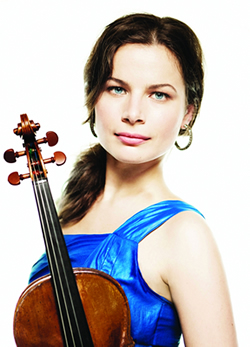Sarah Kirkland Snider, born in 1973; Sergei Prokofiev, born in 1891; Johannes Brahms, born in 1833: three composers whose music differs stylistically enough that no work by one of them could be mistaken for a work by one of the others. The North Carolina Symphony‘s Meymandi Hall concert featured a single work by each of these three, conducted by David Danzmayr. As there was no visible or audible connection between the three pieces, each was a musical island to itself.
Snider’s composition, Something for the Dark, was commissioned by the Detroit Symphony Orchestra after she won that organization’s Lebenbom Memorial Award in 2014. The work’s genesis was affected by the travails which Detroit had endured for some years; indeed, this music can only be properly heard and understood by reading Snider’s own program notes. She quotes the last two lines of Detroit poet Philip Levine‘s For Fran as “an apt motto for the kind of clear-eyed reflection on endurance that runs through the piece:” ‘Out of whatever we have been / We will make something for the dark.’ This music is evocative, conjuring up happy times at its beginning and more troublesome times as it draws to a close. It is full of colors: celesta, muted trumpets, tubular chimes, snare drum interjections. While tonal, it is in no way old-fashioned: melodic lines wander through filigree ostinati; there is a pedal-point, but it’s inverted, a sustained high note played hauntingly by associate concertmaster Dovid Friedlander. While its message is circumscribed by its history, this is music worth hearing again. Perhaps due to its newness, conductor Danzmayr presented it in a straightforward manner, without any of the directorial histrionics which appeared later in the concert.
The Violin Concerto No. 2 by Prokoviev came next, played by Angelo Xiang Yu, making his second appearance with the NC Symphony. His was a masterful performance, in total command of the myriad difficulties of the violin part. The opening Allegro moderato was perhaps a bit fast to be “moderato,” but presented no problems for the 1729 Stradivarius violin which Yu is privileged to play on loan thanks to an anonymous owner. While the first movement suffered balance wise when the orchestra’s winds were loud enough to obscure the soloist’s lines, the next two movements fared better. The slow waltz of the second movement, Andante assai, featured the Strad’s singing upper register, high on the E-string. Danzmayr’s changing of his beat to a slow one-to-the-bar produced a slight rhythmic hitch, perhaps related to the ictus of his beat always being up, rather than down. The orchestra recovered quickly, however, and Prokofiev’s not-so-hidden humor shone through. The movement ended with Yu’s pizzicato solo delivered with closed eyes, his face turned toward the ceiling of the concert hall. The concluding movement, Allegro; ben marcato, features another (but more sardonic) waltz. The ben marcato direction appealed to Danzmayr, who emphasized the music’s rhythmic vitality. After sustained applause, Yu played an encore, likely known to a majority of the audience: the “Méditation” from Jules Massenet’s opera Thaïs. While originally scored for violin and orchestra, the orchestra listened while Yu played the violin solo line only. When he played a pianississimo phrase, the audience was quiet enough to allow all present to hear the beauty of the instrument.
After intermission, we heard the Fourth Symphony by Brahms, the work which gave this concert its name in the program and pre-concert publicity. The orchestra played brilliantly, giving the conductor what he asked for: unfortunately, it was the most bombastic, frenzied reading of this work that I’ve ever heard. The tempi were uniformly on the fast side; the dynamic range was mostly loud-to-loudest. Danzmayr focused so much on individual instrumental lines that the over-arching musical forms suffered. Brahmsian grandeur was lost amid the frenzied reading.
This performance repeats Saturday, April 14 here in Raleigh and Sunday, April 15 in Chapel Hill. See our sidebar for details.











